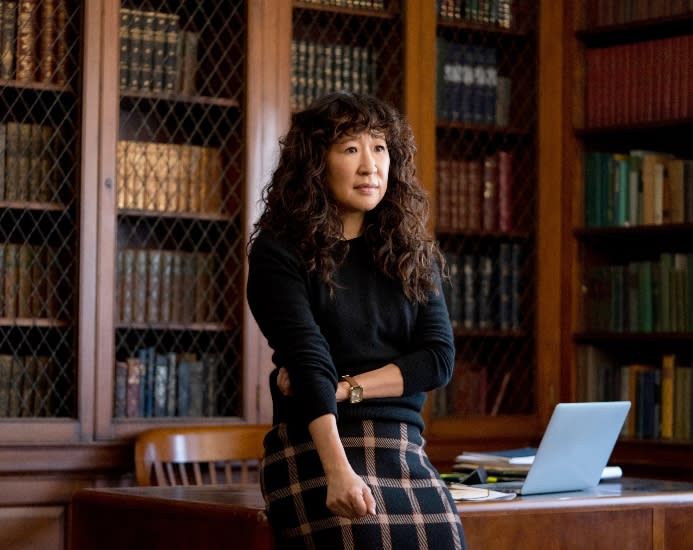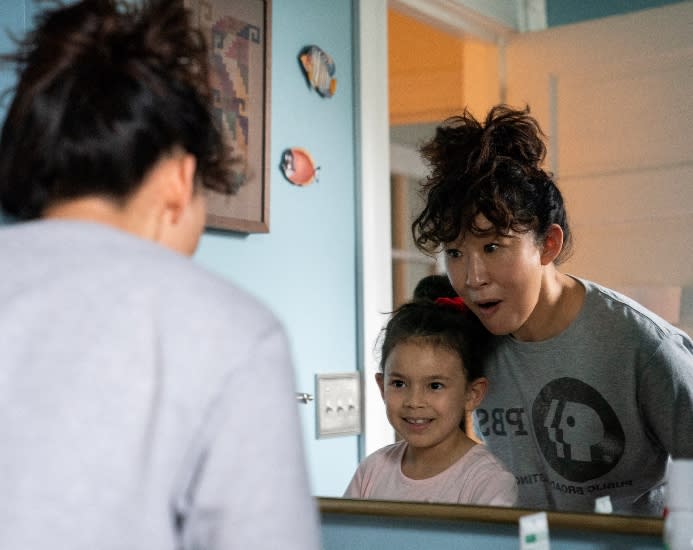Amanda Peet's 'The Chair' Honors The Parenting Stories We Don't See Enough of on TV

- Oops!Something went wrong.Please try again later.
After decades of working in the entertainment industry as an actress, Amanda Peet was ready for a change. The transition from actress to writer/show-runner/executive producer was scary, she recently told SheKnows. But in order to see the stories she wanted to portray onscreen, it was a risk she had to take, and one that wholly succeeded. The Chair, the Netflix series that premiered to fanfare in August 2021, stars Sandra Oh as Dr. Yi-Joon Kim, the first woman of color chair of the English department at Pembroke University. Although The Chair, in both name and logline, centers on the retrograde institutional obstacles she faces in the white-dominated higher education sphere, there’s so much more to the series, including how Peet and the creative team wanted to make a conscious effort to highlight parenting stories we still don’t see enough of on TV.
“We all had a lot of reckoning this past year,” Peet told SheKnows, alluding to the challenges everyone faced throughout the COVID-19 pandemic, during which The Chair filmed. “But I think for some single parents who have trans racial adoptions, I think that there’s just so much to admire about that and about them. I really wanted to try to honor that,” she explained. In the series, Oh’s Dr. Kim is a single parent to Ju-Hee “Ju Ju” (Everly Carganilla), her adoptive daughter with biological heritage that differs from her adoptive Korean family. Throughout the series, Ju Ju and her adoptive mother’s relationship is anything but easy, compounded by Dr. Kim’s already stressful working environment and her strain to be as present a parent as possible.
More from SheKnows
“What was really important to me was to celebrate an alternative family,” Peet said of The Chair. “I still think that we mostly see a white mom or dad, white biological children. And it was really important to me to celebrate something different. And I have a lot of friends who don’t have kids, who have adopted kids later, and a lot of friends who are doing it on their own, and there’s so much to celebrate about that,” she explained. Of course, Peet reiterated that no matter how you became a parent, parenting is “hard, it’s a slog, no matter how you slice it.”
Through her partnership with Oh, the writer found that they “were both really interested in showing an alternative family and showing a mother-daughter relationship that isn’t entirely aspirational.” The final product is a reassuring reminder that parenthood comes in all forms, and The Chair brings to the forefront lived experiences and universal truths that aren’t seen or spoken enough. Read on for our full interview with The Chair writer, show-runner, and producer, Amanda Peet.
SheKnows: It’s exciting to see you make this transition to working behind the camera. I’m really curious, what were you most enthusiastic about with the opportunity of getting to be the show-runner and producer and writer for The Chair?
Click here to read the full article.
Amanda Peet: I think it’s scary because, you know, you can’t pass the buck to anyone. But, I think, with some of the acting roles I was getting as I got older and pushing 50, I wasn’t always able to do projects that articulated anything about where my head was or where I was in life. So I think when I started writing, I was able to employ and deploy certain other parts of myself that were kind of dormant in terms of my acting career, and that’s definitely part of my fault — part for choosing the wrong roles, working with the wrong people — you know, that’s something that I think as I got older, I got more picky about. It bothered me more; the difference when I would do a project that I didn’t believe in or didn’t feel connected to, it started to bother me more.
SK: It was interesting to see how Dr. Kim is trying to push this English department forward, but also trying to maintain these working relationships with her colleagues and really kind of teetering on that line. How important was it to be very deliberate in demonstrating this sort of universal truth that so many women have to experience in any given workplace?
AP: It’s something we talked about a lot. I think I’ve talked about this a little — my daughter’s 14 and she and I argue about her outfits and what it means to be taken seriously as a young woman, so I started to become really interested in the idea of being accused of being an incrementalist — or even an apologist. And I think because I’m getting older, I felt scared that she was becoming more progressive. But I think a lot of that fear was what I wanted to explore.

Eliza Morse / ©Netflix / Courtesy Everett Collection.
SK: Dr. Kim has this really great line where she says that she felt like she’d been handed this ticking time bomb and they [the English department] just waited until it was in her hands, until it was in the hands of a woman of color, for it to go off. I’m wondering, how vital was it to not only do show us what’s happening but have her actually say it?
AP: We are always trying to show don’t tell. To get people to empathize and have empathy for her dilemma, I think, was always first and foremost. She’s sort of caught between these really idealistic students and this really conservative administration and how painful it is to navigate that. And we talked about this, too, but I think oftentimes women in leadership, especially women of color in leadership, you have to do your job, but then you also have to navigate a bunch of ulterior, subliminal shit. We wanted to explore that. Sandra and I were both really interested in exploring that.
SK: Is there a parent-child moment from the show that especially resonated with you?
AP: I wanted to make sure that the part of the show that was depicting the Korean-American experience [would] be very authentic. And so when we cast everybody, it was Sandra who really brought it up to me that you would be very attentive to the idea of celebrating her daughter’s culture, as well. So, that was something that was also really important to us. That storyline came way later in the writing process, because we cast Everly [Carganilla] fairly close to shooting. So, Sandra and I were working on that up until the time of shooting. We all had a lot of reckoning this past year, but I think for some single parents to have trans racial adoptions, I think that there’s just so much to admire about that and about them. I really wanted to try to honor that.
SK: Do you think that there was a universal truth about parenting, single parenthood, that you were hoping audiences would be able to take away from seeing that relationship?
AP: I think what was really important to me was to celebrate an alternative family. I still think that we mostly see a white mom or dad, white biological children, and [it’s] really important to me to celebrate something different. I have a lot of friends who don’t have kids, who have adopted kids later, and a lot of friends who are doing it on their own, and there’s so much to celebrate about that. [Parenting is] hard, it’s a slog, no matter how you slice it…But I think Sandra and I were both really interested in showing an alternative family and showing a mother-daughter relationship that isn’t entirely aspirational.

Eliza Morse / ©Netflix / Courtesy Everett Collection.
SK: Did researching this show offer you a new perspective of either your own time in undergrad or the higher education system in general?
AP: I felt like I was sleepwalking after my undergraduate years. I regret that I was much more interested in getting a boyfriend than I was in the curriculum. Now, I feel really sad about that. And think, “God, why were you such a dummy?” But I think the other thing that was important was to show how the school had shown favoritism to rich white people for so long. And how the schools are struggling to undo that legacy. That was important as well. [For Dr. Kim] to find herself in the midst of that, to find herself in a scenario like that was important to me.
SK: If you could take a whole semester class with any of the professors on The Chair, whose class do you think you would sign up for?
AP: Yaz [McKay, played by Nana Mensah]. We need teachers like that. And it’s a very, very unique talent, I think, to make the classic old works still alive and vivid, and to be transported by one of these old works, I think that if a teacher can inspire that, it’s like lightning in a bottle.
SK: I completely agree. It’s now making me reflect on the professors that I had back in school that really kind of instigated that feeling in me as well.
AP: I remember going into college, I remember, everyone said ‘go with the professor, not the course. Follow the professor, not the subject. And once again, stupidly, I feel like I didn’t listen closely enough to that. But one of the biggest things I took away from the experience was having interviewed all of these professors, I felt, you’ll be surprised and taken aback by how dedicated they are, and how much, maybe this sounds corny, but there’s just so much nobility in teaching. To have that as your lifelong pursuit became very moving to me. And I really wanted to try to honor that, as well. For you to dedicate your life to passing the torch, inspiring people trying to get young minds…I found that really compelling as well.
This interview has been edited and condensed for clarity and length.
Click here to see all the celebrities who have adopted children.
Launch Gallery: 15 Movies & TV Shows That Feature Strong Women of Color in the Lead
Best of SheKnows
32 Kid-Friendly Movies & TV Shows That Educate About Diversity & Race
Every Time Gwyneth Paltrow & Daughter Apple Martin Looked Like Twins
Sign up for SheKnows' Newsletter.
For the latest news, follow us on Facebook, Twitter, and Instagram.


